|
 Secure Site
Secure Site
|
 |
Archive for June, 2012
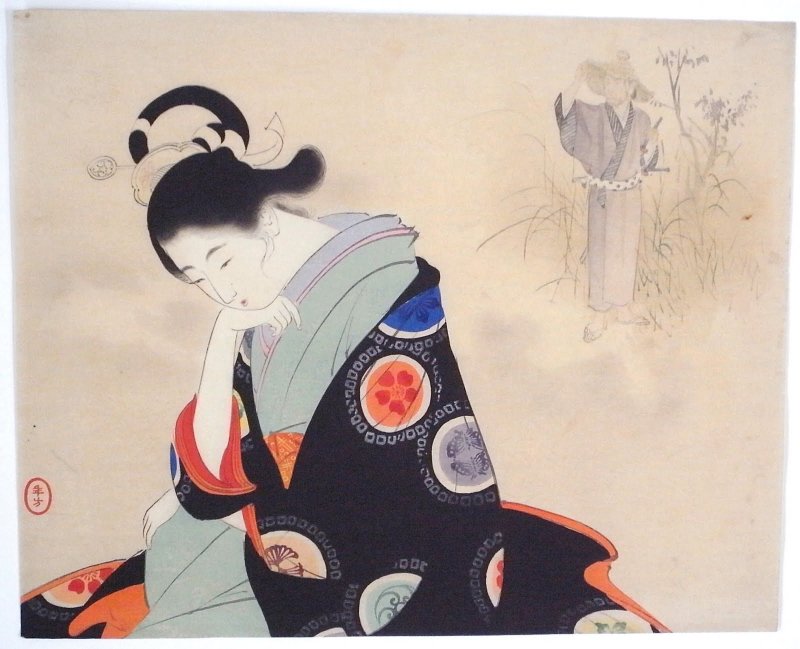 Wake up refreshed, love your alarm clock, transform your mornings with The Zen Alarm Clock's progressive awakening with gentle chimes. Not getting enough sleep may lead to weight gain over time, researchers say
Getting too little sleep can make you hungrier than normal and may lead to weight gain, a small study suggests.
The team at Uppsala University in Sweden used functional MRI to observe the brains of 12 normal weight males while they looked at images of food. This was done on two occasions — after a night of normal sleep and after a night without sleep.
The results showed that a specific brain region that plays a role in appetite shows more activation in response to food images after a night without sleep than after a night of normal sleep.
This suggests that poor sleep habits can affect a person’s risk of becoming overweight in the long run, according to the study published online Jan. 18 in theJournal of Clinical Endocrinology and Metabolism.
 Wake up with gradual, beautiful acoustic chimes. The Zen Alarm Clock transforms your mornings and gets you started right, with a progressive awakening “After a night of total sleep loss, these males showed a high level of activation in an area of the brain that is involved in a desire to eat,” researcher Christian Benedict said in a university news release.
“Bearing in mind that insufficient sleep is a growing problem in modern society, our results may explain why poor sleep habits can affect people’s risk to gain weight in the long run. It may therefore be important to sleep about eight hours every night to maintain a stable and healthy body weight,” Benedict added.
Boulder, Colorado—an innovative company has taken one of life’s most unpleasant experiences (being startled awake by your alarm clock early Monday morning), and transformed it into something to actually look forward to. “The Zen Alarm Clock,” uses soothing acoustic chimes that awaken users gently and gradually, making waking up a real pleasure. Rather than an artificial recorded sound played through a speaker, the Zen Clock features an alloy chime bar similar to a wind chime. When the clock’s alarm is triggered, its chime produces a long-resonating, beautiful acoustic tone reminiscent of a temple gong. Then, as the ring tone gradually fades away, the clock remains silent until it automatically strikes again three minutes later. The frequency of the chime strikes gradually increase over ten-minutes, eventually striking every five seconds, so they are guaranteed to wake up even the heaviest sleeper. This gentle, ten-minute “progressive awakening” leaves users feeling less groggy, and even helps with dream recall.
More information
The U.S. Centers for Disease Control and Prevention has more about preventing weight gain.
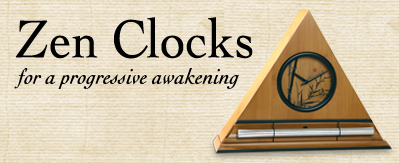 The Zen Alarm Clock transforms mornings, awakening you gradually with a series of gentle acoustic chimes Once you use a Zen Clock nothing else will do Now & Zen – The Chime Alarm Clock Shop
1638 Pearl Street
Boulder, CO 80302
(800) 779-6383
Posted in sleep
 Happiness You don’t have to work for happiness. It’s already here to be experienced in every moment.
Use this practice to rediscover your natural connection with joy.
The more you practice invoking states of well-being, the more available they are. Use the following practice to teach your mind and body to experience joy in the moment. As you invite happiness into your life in this way, you will have more access to a joyful life.
1.Get comfortable and, if you wish, close your eyes. Become aware of your breath, and breathe slowly and deeply. Breathe in relaxation and a sense of ease. Let go of any tension as you exhale. Let the warmth of relaxation flow through your whole body, from your head all the way down to your feet.
2. Find your own way to the still, quiet center of your being, with your body relaxed, your emotions calm, your mind peaceful and spacious.
3. Think of a time when you experienced great joy and well-being, perhaps when you were in a beautiful place or with a good friend.
4. Recall your experience with as much detail as you can. If possible, bring an image of that moment to mind. What was happening? What was the environment like? Were you alone or with others? What sights or sounds can you remember?
5. Remember how the experience of well-being or joy felt in your body. Did your body feel light? Energetic? Expansive? What did joy feel like in your mind? Did your mind feel open? Present? Clear? Take a few moments to let your awareness feel the sensations in your body and the mood in your mind. Let them fully register as you breathe in this feeling of well-being. Relax into it with each exhalation.
6. Practice calling up this image and the feelings of well-being regularly each day for one week. At times, you may find you can simply invoke and sustain those feelings of well-being without having to re-create the specific memory.
Use this practice whenever you are feeling stuck and want to shift to a more uplifted state of mind, or simply want to open yourself to joy.
Although meditation can be done in almost any context, practitioners usually employ a quiet, tranquil space, a meditation cushion or bench, and some kind of timing device to time the meditation session. Ideally, the more these accoutrements can be integrated the better. Thus, it is conducive to a satisfying meditation practice to have a timer or clock that is tranquil and beautiful. Using a kitchen timer or beeper watch is less than ideal. And it was with these considerations in mind that we designed our digital Zen Alarm Clock and practice timer. This unique “Zen Clock” features a long-resonating acoustic chime that brings the meditation session to a gradual close, preserving the environment of stillness while also acting as an effective time signal. The Digital Zen Clock can be programmed to chime at the end of the meditation session or periodically throughout the session as a kind of sonic yantra. The beauty and functionality of the Zen Clock/Timer makes it a meditation tool that can actually help you “make time” for meditation in your life.
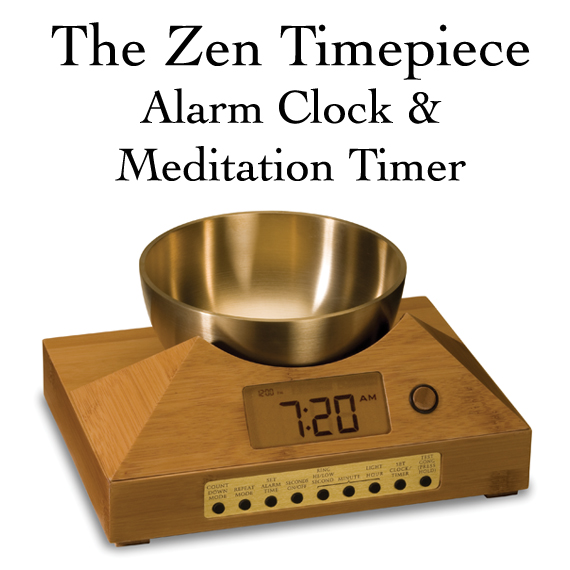 Gong Meditation Timer adapted from YogaJournal.com
Now & Zen – The Gong Meditation Timer Shop
1638 Pearl Street
Boulder, CO 80302
(800) 779-6383
Posted in Bamboo Chime Clocks
 monk Set aside half an hour.
Begin by calling to mind a sage or saint, or another human being you deeply admire. It should be someone you have a feeling for and whose teachings you understand—Jesus, or Buddha, Gandhi, St. Teresa of Avila, the Baal Shem Tov, or your own teacher, if that teacher has been a reliable example of enlightenment.
If no one comes to mind, choose one of the qualities of enlightened consciousness—such as compassion or love. Now, think deeply about that person or the quality you want to embody. Consider how it might be to look through that person’s eyes. If it’s a quality, ask yourself, “How would it be at this moment to look through the eyes of love?” Ask yourself, “How did this being treat others?” How might he or she behave while living your life? (Yes, what would Jesus do?) Imagine facing a challenge, a big conflict, the desertion of someone close. How would that person handle it?
Now, close your eyes and imagine that the spirit of that person (or that quality) inhabits your body. Inhale, thinking to yourself, “Christ’s love lives within me, as my love,” or “Buddha’s state of enlightenment is my enlightenment,” or “The courage of Gandhi is my courage.” Exhale, thinking, “That inner state fills my body.”
 Meditation Practice Do this for a few moments. Then ask yourself, “How would I move through the world if I truly embodied the qualities of this being? How would I treat myself? How would I be with my partner? my kids? my parents? the people on the bus? What would it be like to interact with others?”
Let your imagination completely open to this practice, imagining yourself enlightened, saturated with love. For the remainder of the half hour, act out of that experience. Be the great being you’re imagining yourself to be. Act out the quality you want to imbibe. Do this for half an hour a day for a week and see if you notice the effect.
Meditation is generally an inwardly oriented, personal practice, which individuals do by themselves. Meditation may involve invoking or cultivating a feeling or internal state, such as compassion, or attending to a specific focal point. The term can refer to the state itself, as well as to practices or techniques employed to cultivate the state. There are dozens of specific styles of meditation practice; the word meditation may carry different meanings in different contexts. Meditation has been practiced since antiquity as a component of numerous religious traditions. A 2007 study by the U.S. government found that nearly 9.4% of U.S. adults (over 20 million) had practiced meditation within the past 12 months, up from 7.6% (more than 15 million people) in 2002.
Although meditation can be done in almost any context, practitioners usually employ a quiet, tranquil space, a meditation cushion or bench, and some kind of timing device to time the meditation session. Ideally, the more these accoutrements can be integrated the better. Thus, it is conducive to a satisfying meditation practice to have a timer or clock that is tranquil and beautiful. Using a kitchen timer or beeper watch is less than ideal. And it was with these considerations in mind that we designed our digital Zen Alarm Clock and practice timer. This unique “Zen Clock” features a long-resonating acoustic chime that brings the meditation session to a gradual close, preserving the environment of stillness while also acting as an effective time signal. The Digital Zen Clock can be programmed to chime at the end of the meditation session or periodically throughout the session as a kind of sonic yantra. The beauty and functionality of the Zen Clock/Timer makes it a meditation tool that can actually help you “make time” for meditation in your life.
adapted from YogaJournal.com by Sally Kempton – an internationally recognized teacher of meditation and yogic philosophy and the author of The Heart of Meditation.
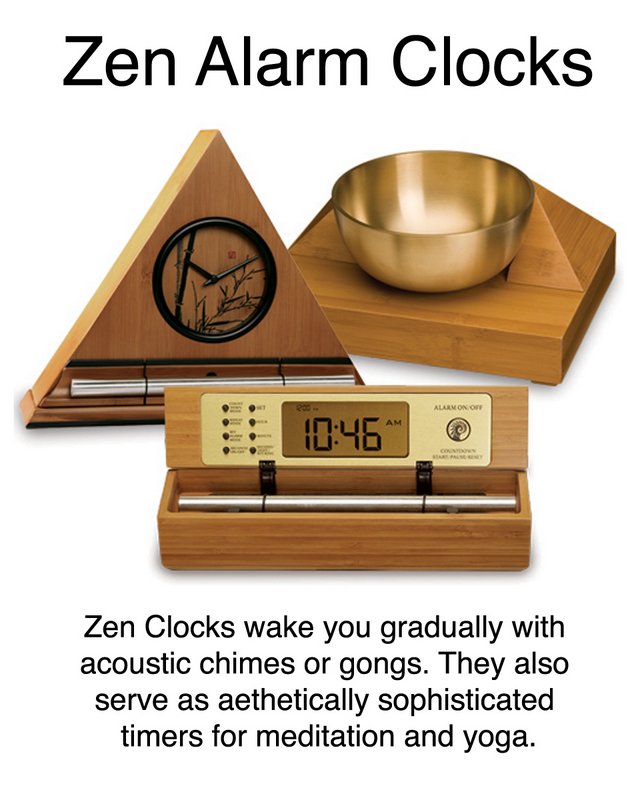 Choose a Chime or Gong Meditation Timer for Your Practice
Posted in Bamboo Chime Clocks
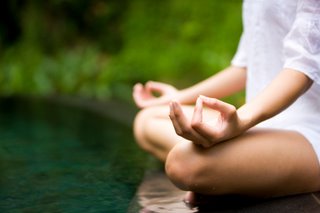 Meditation Problem: You are Tired All the Time
Culprit: Your Adrenal Glands
They’re responsible for secreting the fight-or-flight hormones adrenaline and cortisol, which surge as a response to stress—whether the prehistoric-days type, like being chased by a tiger, or the modern-day version, like financial worries or your mother-in-law. But when you’re feeling stressed all the time, those glands may become overworked and can tire out—a condition commonly called adrenal fatigue, says Keenan. The inability to secrete enough cortisol during the day can cause energy dips, then spikes at night that can interfere with restful sleep.
To give your adrenal glands a chance to recharge, Keenan recommends meditation, which she thinks of as parking the body in neutral. “Meditation has the effect of slowing down the production of cortisol for a while,” she says. Try sitting quietly and clearing your mind. Set your Zen Clock for at least five minutes a day and increase until you are able to sit comfortably for 20 minutes each day. Vitamins B5 and C have also been shown to support adrenal function, says Jacob Teitelbaum, the Kona, Hawaii–based medical director of the Fibromyalgia & Fatigue Centers and the author of From Fatigued to Fantastic!. He recommends getting at least 50 milligrams of B5 and 500 milligrams of C daily. Other stress-reduction techniques work well, too. “Exercise is particularly effective,” says Park.
adapted from RealSimple.com
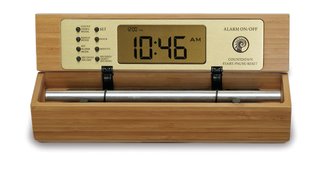 Meditation Tools and Timers by Now & Zen, Inc. Now & Zen Meditation Tool Store
1638 Pearl Street
Boulder, CO 80302
(800) 779-6383
Posted in Chime Alarm Clocks, intention, Meditation Timers, Meditation Tools, mindfulness practice
 Feng Shui your Bedroom for Better Sleep Feng shui is more than an elaborate decorating scheme. The ancient Chinese art of balancing your environment’s energy flow, known as qi (“chee”), can nurture your health and foster longevity.
“The atmosphere of your home will affect you on a physical level,” explains feng shui consultant Lillian Bridges. “For example, insomnia might be related to having too much light in your bedroom, while inflammatory problems might be aggravated by environments that are too chaotic. To a large degree, feng shui is basically common sense combined with good aesthetics.”
To bring positive, health-enhancing energy into your home, ask yourself: What isn’t working in my life? What kind of health conditions am I dealing with? “If you’re depressed, your house may be too dark; bringing in fire energy with more light and warm colors like pinks and peaches can lift your spirits,” Bridges says.
She also suggests covering your windows at night, and guarding your house with such protective symbols as a crimson phoenix, green dragon, or white tiger. “If you don’t feel safe, this can damage the nervous system and lead to stress-related problems like stomachaches and headaches.”
A home filled with clutter can create a “stale energy” that weakens the immune system, according to Total Feng Shui author Lillian Too. Toss out old papers, unwanted clothes, and other inessential belongings at least once a year. Take good care of your plumbing, which Too calls “the arteries of the home.” And as you’re freeing up energy blockages, beautify your house by adding qi-enhancing color to cluttered and dark spaces. Too recommends painting these areas white to invite in active energy, and brightening with soft, warm light. Also, decorate by adding ‘Beauty Elements’ to your home. One might add flowers or a potted Orchid to spaces that need brightening. The Zen Alarm Clock with Chime (Now & Zen, $124.95) will add uplifting ‘Sound Elements’ to beautify your living space.
adapted from Natural Health Magazine, by Elizabeth Barke
 Now & Zen's Chime Alarm Clock Shop in Downtown Boulder Now & Zen’s Clock Store
1638 Pearl St.
Boulder, CO 80302
(800) 779-6383
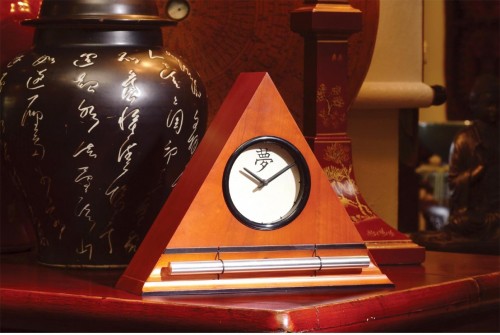 Use Zen Alarm Clocks with Soothing Chime to Feng Shui your Bedroom
Posted in Feng Shui, sleep, Well-being
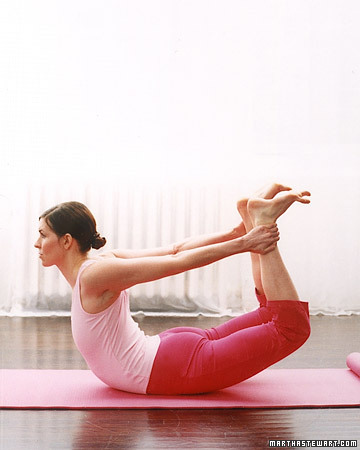 Bow Pose A morning yoga practice composed of the following poses can counter the fiery energy of the hot summer season. On its own or as part of our Ayurvedic weekend retreat, this series is designed to energize without overheating and can be done at home in as little as 30 minutes.
Lie face down, hands by your sides, palms facing up, legs together. Bending at the knees, bring your heels as close to your buttocks as possible. Raise your head, keeping your chin on the floor, then reach back with your hands and grasp your ankles firmly. Pull with your legs and arms, raising your head, chest, knees, and thighs off the floor. Raise your clasped legs as high as possible, keeping the spine relaxed. Rest your entire body weight on your navel. Breathe in and slowly exhale. Hold for 5 to 10 breaths, then release. Repeat the pose two times.
adapted from Wholeliving.com
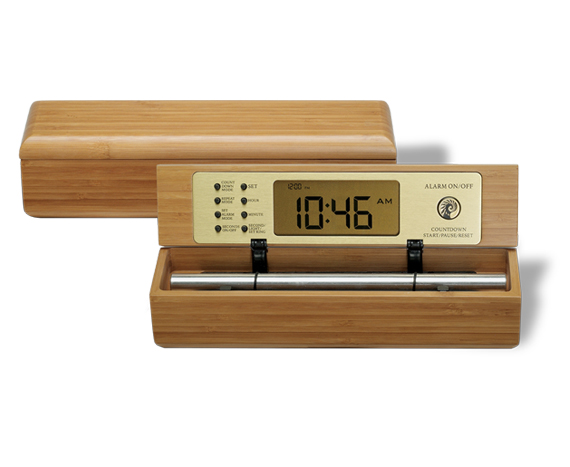 Yoga Timer with Gentle Chime Now & Zen – The Yoga Timer Shop
1638 Pearl Street
Boulder, CO 80302
(800) 779-6383
Posted in Bamboo Chime Clocks
 Once you experience the Zen Timepiece's progressive tones, you'll never want to meditate any other way. Cheap, low-tech stress relief may also protect against depression, insomnia, and anxiety
Meditation is no longer just for the groovy folk. A just published study in the American Journal of Hypertension suggests the practice may bring cardiovascular and mental-health benefits. The research, conducted at American University in Washington, followed 298 students, half of whom practiced transcendentalmeditation for 20 minutes once or twice daily over three months and half of whom did not. Results: A subgroup of subjects in the meditation group who were at increased risk for hypertension significantly lowered their blood pressure and psychological distress and also bolstered their coping ability. The average reduction in blood pressure in this group—a 6.3-mm Hg decrease in the top (systolic) number of a blood pressure reading and a 4-mm Hg decrease in the lower (diastolic) number, compared with the control group—was associated with a 52 percent reduction in the risk of developing hypertension in the future. Meditators who were not at increased risk for hypertension saw a reduction in psychological distress, depression, and anxiety as well as increased coping ability but no significant lowering of blood pressure. The results are particularly meaningful at a time when “improvement in mental health is of great concern as greater numbers of college students are being treated for anxiety and depression than ever before,” says lead study author, Sanford Nidich, professor of physiology and health at the Institute for Natural Medicine and Prevention at Maharishi University of Management in Iowa.
Lately, meditation has been garnering attention from a host of medical and scientific researchers. More than 120 meditation studies are listed on clinicaltrials.gov, a clearinghouse for research supported by the National Institutes of Health, investigating the intervention in patients with conditions from cancer and heart disease to post-traumatic stress disorder, insomnia, and binge eating. It’s no cure-all, but early research is suggesting meditation could play a helpful role in mediating the stress response that contributes to a number of physical and mental conditions.
In a country famous for medical innovation and high-tech treatments—not to mention their high cost—Americans, too, have begun to embrace complementary and alternative interventions like meditation, acupuncture, and “natural” supplements. According to a recent study sponsored by the NIH’s National Center for Complementary and Alternative Medicine, more than 1 in 3 adults sought such healthcare in 2007—and collectively spent $40 billion out of pocket. But with the exception of the classes, books, or CDs one might buy to learn the ins and outs of “om,” focusing on one’s breath, or becoming more mindful, the practice of meditation is free.
One simple thing seems clear: Find a type of meditation that you like. “What’s really important,” says Richard Davidson, neuroscience and meditation researcher at the University of Wisconsin-Madison,” is that a person find a particular style [of meditation] they’re comfortable with so they continue to practice.” Some styles train practitioners to focus on an object or a mantra; others cultivate positive emotions; others still aim to train practitioners not to judge thoughts that arise but to just accept them and not get attached. More meditation, it seems, offers stronger effects; Davidson’s research on monks who had practiced for tens of thousands of hours in their lifetimes managed to change their brains’ functioning and structure. Benefits appear to be attainable with less of a time commitment, he adds—perhaps somewhere between 20 and 40 minutes daily.
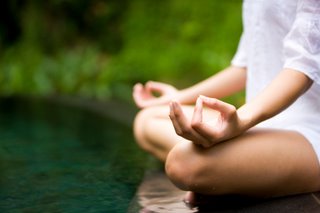 Meditation Pose Not all doctors have bought into the merits of meditation as a treatment, nor should they just yet. The hard research medical practitioners swear by is still in the early stages. The National Center for Complementary and Alternative Medicine is starting to fund needed research with larger sample sizes of participants and solid study design, says Jeffrey Greeson, meditation researcher and assistant clinical professor in the department of psychiatry and behavioral sciences at Duke University School of Medicine. He predicts that results will begin to emerge in the next five years. Meantime, based on some encouraging preliminary findings, here are five reasons a clinician hip to the importance of the mind-body connection may cite for prescribing meditation—and one reason she may choose not to.
By SARAH BALDAUF for US News
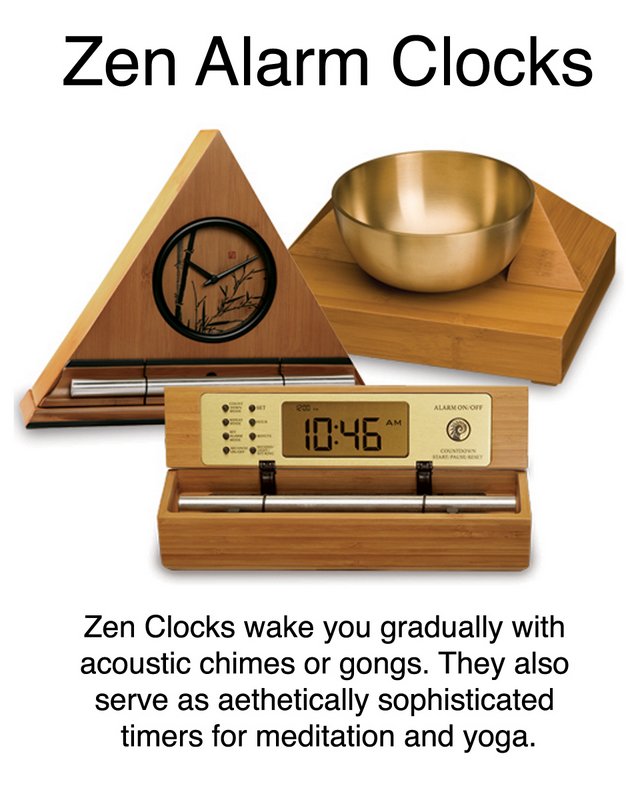
Now & Zen – The Meditation Timer Store
1638 Pearl Street
Boulder, CO 80302
(800) 779-6383
Posted in Meditation Tools
 Harunobu Suzuki, A girl Collecting Cchrysanthemum Dem by the Stream Culprit: The Blues
Research has indicated that people with depression may be four times more likely than the nondepressed to experience unexplained fatigue. Aerobic exercise—specifically, 30 minutes or more three to five days a week—is effective at treating mild to moderate depression, and may minimize the sleepiness associated with it. Set your Zen Timer for 30 minutes and try a few yoga poses in the comfort of your own home. If that doesn’t help, however, speak to your doctor, who may recommend talk therapy or a mood-boosting medication, like a selective serotonin re-uptake inhibitor (SSRI). If your depression and related fatigue seem to strike more frequently in winter, you could have seasonal affective disorder (SAD). Treatment for SAD may include using a special light box, says Marla Wald, a psychiatrist at Duke University Medical Center, in Durham, North Carolina. But venturing outside for about 20 minutes a day can provide similar benefits, she says.
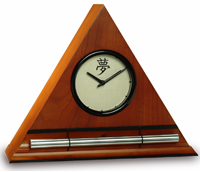 banish the blues by setting your zen timer Now & Zen Headquarter Store
1638 Pearl Street
Boulder, CO 80302
(800) 779-6383
Posted in Chime Alarm Clocks, mindfulness practice, Zen Alarm Clock, Zen Timepiece by Now & Zen
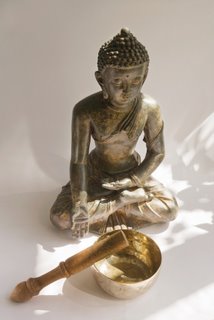 Carved Wooden Thai Buddha with Singing Bowl The Habit: Running Late
Why you do it: The nice reason? You’re a pleaser and an overdoer, packing too much in. Not so nice? Deep down, you may think your time is more important than the time of those waiting. Either way, you lack some essential time-management skills.
How to stop: When someone asks you to do something, don’t accept right away. Say you’ll get back to him, then decide whether you have the time. Also, figure out which tasks always seem to make you late. Maybe it’s drying your hair in the morning: Time yourself to see how long it takes, then allot enough time in your routine. Tricks: Set your Zen Timepiece with Gong Alarm five minutes fast and build in time for unexpected delays. And always call ahead if you’re running late. Not only is it gracious but the shame of making repeated calls might also be the incentive you need to be punctual.
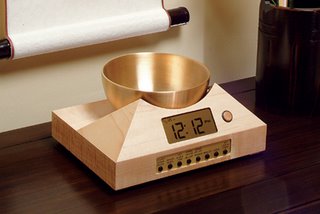 Now & Zen 1638 Pearl Street Boulder, CO 80302
Posted in Chime Alarm Clocks, Now & Zen Alarm Clocks, sleep, Sleep Habits
 Butterflies Plate #21, Natural History of Britain on the patio
the afternoon drifts along
with the butterfly.
– Patricia J. Machmiller
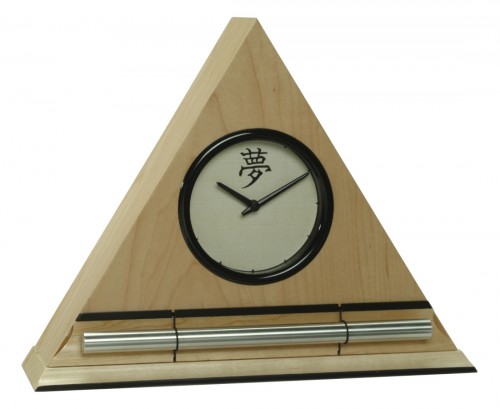 Maple Dream Kanji Zen Alarm Clock, progressive chime alarm clock
Now & Zen – The Zen Alarm Clock Store
1638 Pearl Street
Boulder, CO 80302
Posted in Beauty, Japanese Inspired Zen Clocks, Japanese Poetry, Meditation Timers, Meditation Tools, mindfulness practice, Now & Zen Alarm Clocks, Progressive Awakening
« Previous Page — « Previous Entries
Next Entries » — Next Page »
|
|
|
|